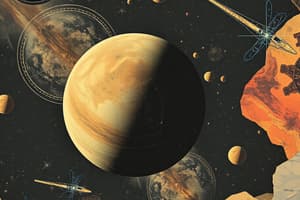Podcast
Questions and Answers
What is the role of light in understanding the universe?
What is the role of light in understanding the universe?
- It allows us to see celestial bodies only during the day.
- It reflects the characteristics of planets and moons. (correct)
- It solely reveals the distance of stars from Earth.
- It determines the shape of the solar system.
Which discovery is attributed to Copernicus?
Which discovery is attributed to Copernicus?
- He discovered the first exoplanet.
- He proposed the heliocentric model with the sun at the center. (correct)
- He invented the first telescope.
- He placed the Earth at the center of the solar system.
How do telescopes contribute to our understanding of the cosmos?
How do telescopes contribute to our understanding of the cosmos?
- They magnify and capture light to reveal celestial features. (correct)
- They alter the color of light from stars.
- They can only view nearby planets.
- They create artificial light to illuminate distant objects.
What evidence suggests Mars may have once supported water?
What evidence suggests Mars may have once supported water?
Which type of light reveals hidden structures like black holes?
Which type of light reveals hidden structures like black holes?
What characteristic of distant light sources was surprising to astronomers?
What characteristic of distant light sources was surprising to astronomers?
What did telescopes reveal about our solar system?
What did telescopes reveal about our solar system?
What is suggested about Pluto’s characteristics?
What is suggested about Pluto’s characteristics?
What aspect of ongoing exploration of the universe is emphasized?
What aspect of ongoing exploration of the universe is emphasized?
Flashcards
Heliocentric Model
Heliocentric Model
The sun is at the center of our solar system, with planets orbiting around it.
Light As Information
Light As Information
Light from stars, planets, and other celestial objects can be used to understand their properties.
Types of Light
Types of Light
Different types of light, like radio waves and X-rays, reveal different aspects of the universe.
Telescopes
Telescopes
Signup and view all the flashcards
Spacecraft Exploration
Spacecraft Exploration
Signup and view all the flashcards
Exoplanets
Exoplanets
Signup and view all the flashcards
Celestial Diversity
Celestial Diversity
Signup and view all the flashcards
Ongoing Exploration
Ongoing Exploration
Signup and view all the flashcards
Universal Complexity
Universal Complexity
Signup and view all the flashcards
Study Notes
Beyond Our Earth
- Earth is a small part of a vast solar system, galaxy, and universe.
- Humans have studied the night sky since the beginning of time.
- Studying star patterns, moon cycles, and the sun's composition helps determine the universe.
- Recent centuries have provided enough space knowledge to plan trips to the moon and other planets.
Studying the Universe
- Light reveals the surfaces of planets and moons.
- Analyzing starlight's spectrum shows the composition and temperature of stars.
- Changes in light indicate the movement of stars, planets, and comets.
- Telescopes have revealed new planets, moons, and galaxies. The universe is expanding.
Invisible Forms of Light
- Light, such as radio waves, X-rays, and gamma rays, points to black holes.
- Spacecraft sent to planets and the moon gather further data.
Surprises in the Universe
- Mars might have had flowing rivers.
- Moons may have hidden oceans.
- Pluto may have ice mountains.
- The universe is much more mysterious and fascinating than previously imagined.
Studying That Suits You
Use AI to generate personalized quizzes and flashcards to suit your learning preferences.




